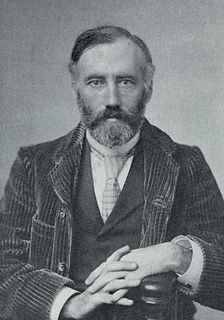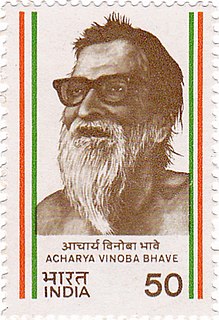A Quote by Swami Vivekananda
Jnana, bhakti, yoga and karma - these are the four paths which lead to spiritual freedom. One must follow the path for which one is best suited. But in this age, special stress should be laid on karma yoga.
Related Quotes
There is good Karma, there is bad Karma, and as the wheel of life moves on, old Karma is exhausted and again fresh Karma is accumulated... Karma is twofold, hidden and manifest, Karma is the man that is, Karma is his action. True that each action is a cause from which evolves the countless ramifications of effect in time and space... To the worldy man Karma is a stern Nemesis, to the spiritual man Karma unfolds itself in harmony with his highest aspirations.
Yogas chitta vritti nirodhah - (Yoga is to check the mind from changing) - which is acceptable to all. That is also the goal of all. The method is chosen according to one's own fitness. The goal for all is the same. Yet different names are given to the goal only to suit the process preliminary to reaching the goal. Bhakti, Yoga, Jnana are all the same.
Who cares for your bhakti and mukti? Who cares what your scriptures say? I will go into a thousand hells cheerfully if I can rouse my countrymen, immersed in tamas, to stand on their own feet and be men inspired with the spirit of karma-yoga. I am a follower only of he or she who serves and helps others without caring for his own bhakti and mukti!
Karma is not something pessimistic. If you think of karma as something wrong, you are seeing karma only according to what happened in the past. You look at the past and karma becomes a monster. So you should also look at karma in the present and future. Then karma becomes something very wide and really alive. Through karma you can understand what your destiny is. Destiny itself has no solid form; it's something you can create. You can create your life. That is why we study karma.
Indian forms of yoga have spread throughout the world due to their objectives of promoting health and harmony. Japan is but one of many countries that have received these age-old teachings. While Indian yogic disciplines (Hatha yoga in particular) have become well known, not everyone realizes that certain distinctive Japanese versions of Indian spiritual paths have evolved. Perhaps the first of these unique methodologies is the art of Shin-shin-toitsu-do, which was developed by Nakamura Tempu Sensei (1876-1968). In fact, Nakamura Sensei is often considered to be the father of yoga in Japan.

































